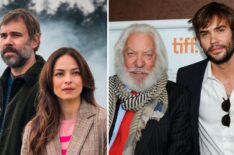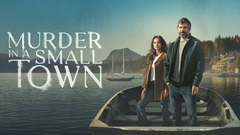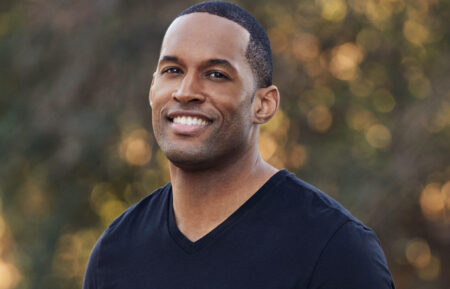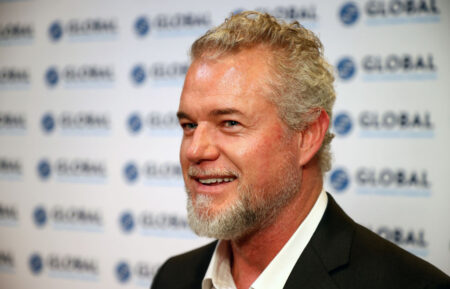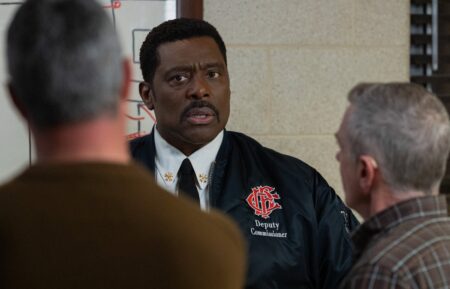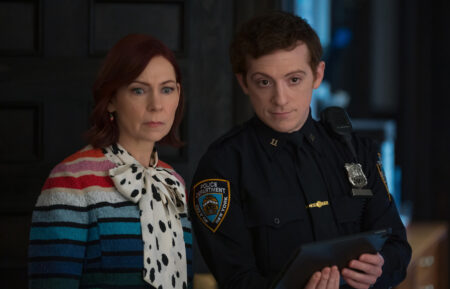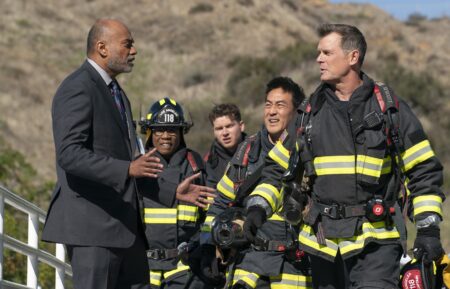‘Murder in a Small Town’: Rossif Sutherland & Kristin Kreuk Talk Filming Awkward First Date and Characters’ Moral Compasses
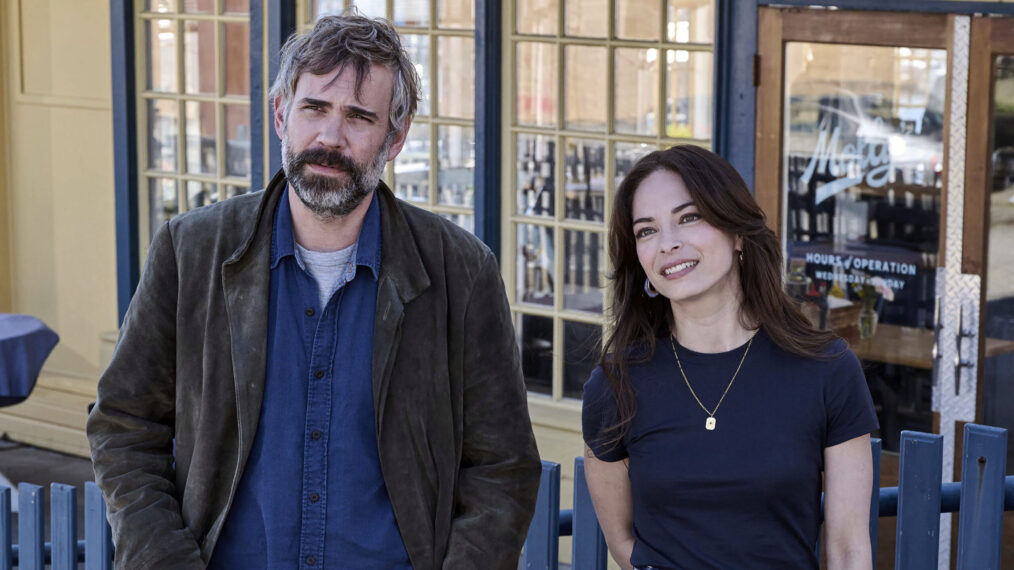
Premiere
[Warning: The following post contains MAJOR spoilers about the series premiere of Murder in a Small Town, “The Suspect.”]
Murder in a Small Town‘s series premiere might be focused on solving the mystery of who committed a horrible homicide, but the real centerpiece of the story is the budding relationship between Cassandra Lee (Kristin Kreuk) and Karl Alberg (Rossif Sutherland).
At the beginning of the episode, the two meet for a blind date, and, after a somewhat awkward start, they hit it off. Karl, the new chief of police in the tiny town of Gibsons, British Columbia, is newly divorced, while Cassandra is the local librarian who’s been very unlucky in love.
It doesn’t take long, though, for their newfound romantic bond to be put to the test; when Cassandra’s acquaintance George Wilcox (James Cromwell) becomes the prime suspect in the murder of his ex-brother-in-law, Karl faces a moral dilemma about whether to lock the otherwise docile old man up for life or let him live out his days elsewhere and let the case go cold. Ultimately, he opts for the latter, but still, there are some major question marks about what this means for the couple at the center of the story, who each lied to one another along the way to that decision.
TV Insider spoke with the two leads to find out how they established that complicated dynamic so quickly and what’s ahead as the inaugural season unfolds.
The premiere starts with you two having a pretty awkward first date. How fun was it for you to begin the show with that dynamic between the two characters?
Rossif Sutherland: It was so much fun. It was the first thing we shot.
Kristin Kreuk: It was a bit of a nerve-wracking day.
Sutherland: Day one of the show, everyone from the studios around, everyone from the network. So it was pretty much an audition again, I guess. But we had so much fun… It was great, and I’m so happy we started that way because we got to set the relationship and set the tone of that right from the start, that awkwardness that you felt watching it, we felt that, too, doing it as she said, it was the first day. So it made sense to start with [that]. This person sitting next to me was an absolute joy to work with, and the chemistry that these characters have resembled a lot of the chemistry that we had just working together.
How would you describe Karl’s investigatory skills? They’re pretty unique.
Sutherland: Karl became a police officer out of curiosity. He has a skill for puzzles, but he’s fascinated with people and their motivations. He became a detective, followed the training and was surrounded by all these detectives, these men who practiced his job in the classic way of intimidation and power. And he thought that it was the wrong approach. I don’t think he was really accepted in the big city where he worked, but now he’s been tasked to be the chief of police in this small town. This is not long after his divorce. He’s reinventing his life, but now he’s the boss, and it wasn’t necessarily a job that a lot of people wanted, because you have to uproot your life, but he gets a real fresh start, and he gets to do things the way that he wants things done, and that is to be a leader that celebrates those who are around him. He’s somebody who delegates trust the instincts of the people that he mentors and it’s his humanity.
I was so happy to play somebody who is not possessed by demons, somebody who doesn’t go along the feeders, alcohol problem, somebody who doesn’t have all these problems with anger and violence. He’s a good man, and I think that’s his approach. You forget he’s a cop.
Yeah. Kristin, are we gonna get to find out what kind of literary interests Cassandra has and how her library and career come into play with the show?
Kreuk: Yeah. I mean, it’s interesting. When I started to really look into librarians and the work that goes into becoming one, it’s a really complicated degree, and it’s a very data-oriented degree, and her drive is less — she pursued a literary degree. This is the only real long-term relationship she had. And she — this is all backstory, but she dropped that degree in order to pursue being a librarian because she cares about the community. She cares about the community that she came from, and she has a vision for that community. And as the season goes on, you’ll see Cassandra really pushing to build an art center. She will become more and more engaged in community politics. It becomes something that’s very dear to her heart, and she has a very established goal that she’s trying to accomplish while she is living in the town that she loves so much.
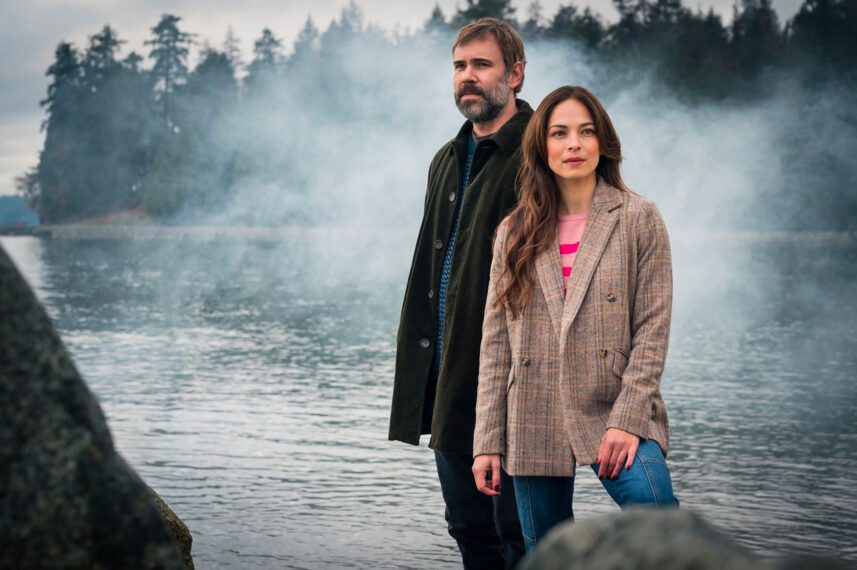
Fox
So it sounds like this show is also a lot about the town and location, but what kind of crimes will they have to grapple with in the coming episodes?
Sutherland: Most of it has to do with jealousy and greed. And yes, it’s not necessarily serial killers. Oftentimes, these are people who are committing violent crimes for the first time. There are some passionate crimes. There are some calculated crimes. There are some episodes where there is no murder. We were grappling with the formula of the show, whether it should be whodunit or whydunit. And we go back and forth between both formulas because the fascination is not just who did it, but why they did it. And again, that goes back to the curiosity of the detective that I play. He’s looking at things from the human angle, not necessarily judging good and bad, but figuring out why.
That moral compass that he has and Cassandra has — they both took it easy on George Wilcox — is that going to come between them, or is that going to strengthen their bond?
Kreuk: I feel like with George, they had a lot of conflict regarding how to handle George, and I love that about the first episode. It’s one of my favorite things about that episode is the difference in their opinion on how to handle this man and what he has done and looking at him as a man in a moment or a man who is the kind of culmination of his entire life. But I think the difference between them—I don’t know, I feel like there’s a difference between them, as opposed to the similarity, although they agree on some aspects of this. I think one is a detective, the other is a librarian. When it comes to their character, who’s an old man who’s lived a decent life, and now as an old man has committed this crime.
Sutherland: My character has obligations. I can have compassion. I actually like that character, but I have a job to do, and it’s the dilemma of… Do I let him be, do I let him live out the rest of his life? Or do I do my job? And ultimately, it is my job.
Is that going to continue to be a problem for him, that moral conundrum?
Sutherland: I don’t think we replay the same beat over and over again. The dynamic between, I think, how the two of them handle these things changes throughout the season, and I don’t think this is a conflict that Karl comes into with himself over and over again. No, it’s not. I think it’ll always exist as a tone, but it is not the main conflict all the time.
Murder in a Small Town, Tuesdays, 8/7c, Fox

